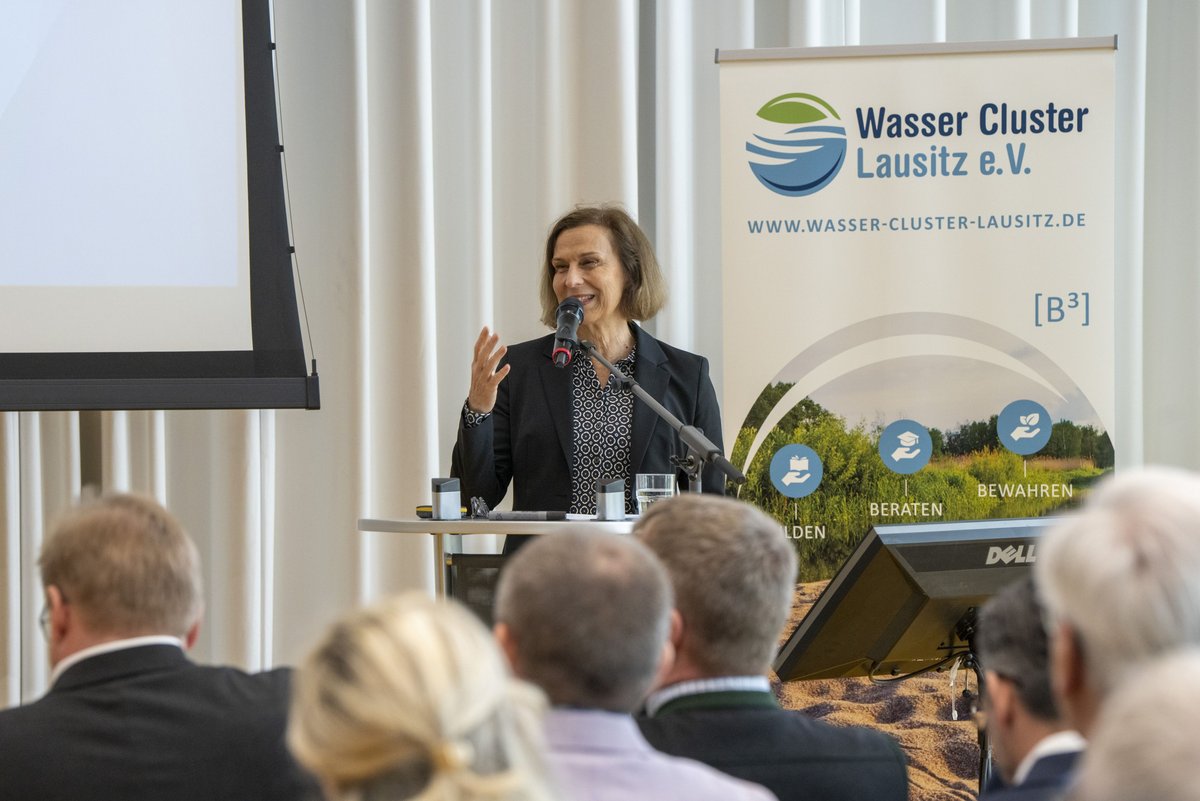3rd Lusatian Water Conference: Setting the course for a secure water supply
Under the title "Structural change in the water industry in Lusatia: at a crawl or full speed ahead?", they discussed the topic with around 170 participants from administration, politics and business on site in Cottbus as well as a further 100 online participants from Germany and abroad. The event was organised by Wasser-Cluster-Lausitz e.V. together with the Cottbus Chamber of Industry and Commerce (IHK) and the Brandenburg University of Technology Cottbus-Senftenberg (BTU).
Prof. Gesine Grande, President of BTU, emphasised the role of the university as a platform for professional exchange and discourse in her opening speech: "The topic of water is one of the greatest challenges facing Lusatia and the world. We can contribute to solutions with scientific knowledge and that of our graduates."
For a reliable water supply in Lusatia
André Fritsche, Managing Director of the Cottbus Chamber of Industry and Commerce, emphasised: "Water is an important location factor for companies. The economy must be able to trust that the economic situation will not come under further pressure because water becomes scarce. The success of structural change depends on water management solutions. Lusatia will be dry by 2038 at the latest with the end of coal mining if we don't take countermeasures now."
The supreme water authorities of the states of Berlin, Brandenburg and Saxony, represented by their department heads Dr Birgit Fritz-Taute, Anke Herrmann and Dr Regina Heinecke-Schmitt, conducted an assessment of the extensive water management challenges in Lusatia. They were convinced that the planned work plan will provide a solid basis for decision-making on the current issues of water supply and water transfer in the coming years.
The importance of rapid progress is clear to everyone involved. Berlin State Secretary for the Environment Britta Behrendt had clear words on the subject: "We are aware of the connections between the coal phase-out in Lusatia and a secure water supply for the Berlin-Brandenburg metropolitan region and are firmly on the side of the states of Brandenburg and Saxony in the preparation and implementation of sustainable water management solutions. However, the scale of this multi-generational task also makes it imperative that the federal government continues to be involved in this process in the future."
Challenges for wastewater too
Dr Claus Gerhard Bannick from the Federal Ministry for the Environment, Nature Conservation, Nuclear Safety and Consumer Protection outlined the current status and prospects in his presentation on the establishment of a real-world laboratory centre for innovative water and wastewater technology in Lusatia. The challenges facing wastewater treatment in Germany were also highlighted in this context.
The conference concluded with an exciting panel discussion on the possible reorganisation of management structures in Brandenburg's Lusatia region in view of the many post-mining lakes. Discussion moderator Prof. Michael Hübner, BTU Vice President for Research and Transfer, summarised: "This was just a prelude to a more in-depth discussion on whose responsibility the many post-mining lakes that have already been created and are still being created should be in the long term."
Dates:
The 4th Lusatia Water Conference of Wasser-Cluster-Lausitz e.V. is already scheduled for 26 March 2027.
12 to 13 May 2025, Berlin
3rd Interstate Water Congress Berlin-Brandenburg-Saxony of the IHKs Berlin-Brandenburg and Saxony together with the VBKI, VKU Regional Group Berlin-Brandenburg and Saxony
For further information please contact:
Ingolf Arnold, First Board Chairperson Wassercluster Lausitz e. V., T +49 (0)173 576 0134, ingolf.arnold(at)wasser-cluster-lausitz.de
Dorit Köhler, Head of Innovation and Sustainability at the Cottbus Chamber of Industry and Commerce, T +49 (0)355 365 1500, dorit.koehler(at)cottbus.ihk.de
Press contact
Kommunikation und Marketing
T +49 (0) 355 69-3837
britta.radkowsky(at)b-tu.de

